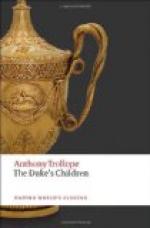So much in praise of Major Tifto honesty has compelled the present chronicler to say. But there were traits of character in which he fell off a little, even in the estimation of those whose pursuits endeared him to them. He could not refrain from boasting,—and especially from boasting about women. His desire for glory in that direction knew no bounds, and he would sometimes mention names, and bring himself into trouble. It was told of him that at one period of his life, when misfortune had almost overcome him, when sorrow had produced prostration, and prostration some expression of truth, he had owned to a friend his own conviction that could he have kept his tongue from talking of women, he might have risen to prosperity in his profession. From these misfortunes he had emerged, and, no doubt, had often reflected on what he himself had then said. But we know that the drunkard, though he hates drunkenness, cannot but drink,—that the gambler cannot keep from the dice. Major Tifto still lied about women, and could not keep his tongue from the subject. He would boast, too, about other matters,—much to his own disadvantage. He was, too, very ‘deep’, and some men, who could put up with his other failings, could not endure that. Whatever he wanted to do he would attempt round three corners. Though he could ride straight, he could do nothing else straight. He was full of mysteries. If he wanted to draw Charter Wood he would take his hounds out of the street at Egham directly in the other direction. If he had made up his mind to ride Lord Pottlepot’s horse for the great Leamington handicap, he would be sure to tell even his intimate friends that he was almost determined to take the ‘baronet’s’ offer of a mount. This he would do even when there was no possible turn in the betting to be affected by such falsehood. So that his companions were apt to complain that there was no knowing where to have Tifto. And then, they who were old enough in the world to have had some experience in men, perceived that peculiar quality of his eyes, which never allowed him to look anyone in the face.
That Major Tifto should make money by selling horses was, perhaps, a necessity to his position. No one grumbled at him because he did so, or thought that such a pursuit was incompatible with his character as a sporting gentleman. But there were some who considered that they had suffered unduly under his hands, and in their bargains with him had been made to pay more than a proper amount of tax for the advantages of his general assistance. When a man has perhaps made fifty pounds by using a ‘straight tip’ as to a horse at Newmarket, in doing which he had of course encountered some risks, he feels he ought not be made to pay the amount back into the pockets of the ‘tipper’, and at the same time to find himself saddled with the possession of a perfectly useless animal. In this way there were rocks in the course through which Tifto was called on to steer his bark. Of course he was anxious, when preying upon his acquaintances, to spare those who were useful friends to him. Now and again he would sell a serviceable animal at a fair price, and would endeavour to make such a sale in favour of someone whose countenance would be a rock to him. He knew his business well, but yet there would be mistakes.




